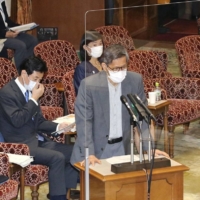Japan’s top COVID-19 adviser expressed caution Thursday about a government-backed program that will allow school students to be spectators at Tokyo Paralympics events, citing the severity of coronavirus infections in the country.
“The status of infections is a lot worse now” compared to when the 17-day Tokyo Olympics were held from July 23, Shigeru Omi, chairman of a government subcommittee on the nation’s COVID-19 response, told a Diet hearing ahead of the start of Paralympics on Tuesday.
“When considered in those circumstances, there is a natural conclusion to draw,” he said when asked by an opposition party lawmaker about whether it was appropriate to allow students at Paralympic venues.
The International Paralympic Committee, the Tokyo Organising Committee, the Tokyo Metropolitan Government and the central government agreed earlier this week to bar spectators at all Paralympic venues, which are located in Tokyo and the prefectures of Chiba, Saitama and Shizuoka.
But they confirmed that as an exception, students of local schools taking part in a government-backed educational program would be allowed to watch competitions in person, if municipalities and schools wish.
The local governments and schools are taking a cautious stance, and plan to respect the opinions of students and their guardians when determining whether students join the program.
At an online meeting on Wednesday of the metropolitan government’s board of education, many members expressed opposition, saying that “the infection risk is so high.”
Japan is grappling with its largest wave of infections yet, with the nationwide tally of new cases topping 23,000 in its latest record high on Wednesday.
The government has decided to extend a COVID-19 state of emergency covering Tokyo and five other prefectures to Sept. 12, beyond the previous end date of Aug. 31, while expanding the measure to seven more prefectures.
At the Diet hearing, Omi also urged the government and municipalities to set up more emergency medical and accommodation facilities to cope with the rising number of patients.
“Now is the time for the central and local governments to take stronger leadership than ever in tackling the situation from the viewpoint of disaster medical care,” Omi said.
“I want them to take all necessary countermeasures by fully utilizing the special measures law” on responses to the novel coronavirus crisis, he said.
In a time of both misinformation and too much information, quality journalism is more crucial than ever.
By subscribing, you can help us get the story right.
SUBSCRIBE NOW




